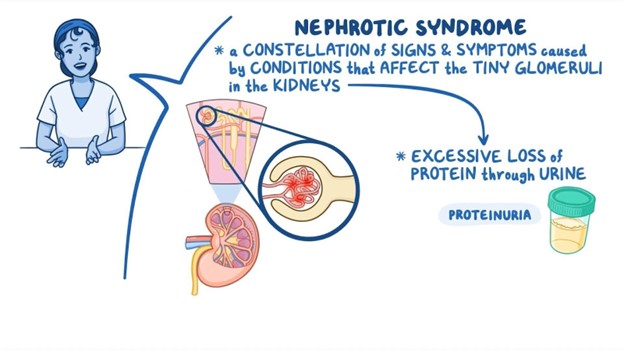A 4-year-old with nephrotic syndrome is experiencing severe periorbital edema. The best measure the nurse could institute to help reduce the periorbital edema is:
apply cool sterile soaks to the child's head
apply warm compresses
encourages the child to eat low protein foods
elevate the head of the bed
The Correct Answer is B
A. Apply cool sterile soaks to the child's head.
Explanation: Applying cool sterile soaks to the child's head would not directly address periorbital edema. Nephrotic syndrome is a kidney disorder that results in proteinuria (loss of protein in urine), leading to fluid accumulation and edema. Cooling the head would not have a significant impact on reducing periorbital edema caused by nephrotic syndrome.
B. Apply warm compresses.
Explanation: Correct Choice. Applying warm compresses can help increase blood circulation and promote the reabsorption of excess fluid causing periorbital edema. Warmth can dilate blood vessels and improve the movement of fluids, potentially alleviating the edema.
C. Encourage the child to eat low protein foods.
Explanation: While dietary modifications might be part of managing nephrotic syndrome, specifically encouraging low protein foods may not directly address periorbital edema. The primary treatment for nephrotic syndrome involves medications to control proteinuria and manage fluid balance.
D. Elevate the head of the bed.
Explanation: Elevating the head of the bed is more commonly used to manage conditions like heart failure or obstructive sleep apnea. It might have some impact on overall fluid distribution, but it's not the most effective measure for reducing periorbital edema caused by nephrotic syndrome.

Nursing Test Bank
Naxlex Comprehensive Predictor Exams
Related Questions
Correct Answer is D
Explanation
A. Using a suppository for bowel movement is a common approach for managing bowel function in people with paralysis and is appropriate.
B. Carrying a water bottle to stay hydrated is important, especially since individuals with paralysis may be at increased risk of urinary tract infections. Adequate hydration is beneficial.
C. Doing wheelchair exercises while watching TV is a proactive way to maintain muscle tone and overall health, which is crucial for individuals with paralysis.
D. "I only need to catheterize myself twice every day!"
Explanation: In the context of spina bifida and paralysis from the waist down, catheterization is often required for bladder management. Individuals with this condition often experience urinary retention and require intermittent catheterization to empty their bladder. However, "twice every day" is not usually sufficient for someone with paraplegia. Adequate catheterization frequency is crucial to prevent urinary retention, infections, and other complications.
Correct Answer is A
Explanation
A. Levothyroxine
Correct Answer: Levothyroxine should be administered before breakfast.
Explanation: Levothyroxine is a synthetic thyroid hormone used to treat hypothyroidism. It needs to be taken on an empty stomach, at least 30 minutes before eating, to ensure proper absorption. Food can interfere with its absorption, especially foods containing calcium, iron, and fiber.
B. Digoxin
Incorrect Explanation: Digoxin does not need to be administered before breakfast.
Explanation: Digoxin is a medication used to treat heart conditions like congestive heart failure and atrial fibrillation. It doesn't have specific instructions regarding administration in relation to meals. It's important to administer digoxin consistently at the same time every day, but it doesn't need to be taken specifically before or after breakfast.
C. Divalproex
Incorrect Explanation: Divalproex does not need to be administered before breakfast.
Explanation: Divalproex is used to treat conditions like epilepsy and bipolar disorder. It can be taken with or without food. While taking it with food might reduce the likelihood of stomach upset, there's no requirement to take it specifically before breakfast.
D. Mycostatin Mouthwash
Incorrect Explanation: Mycostatin mouthwash is not related to breakfast timing.
Explanation: Mycostatin is an antifungal medication used to treat fungal infections in the mouth (oral thrush). Its administration is not linked to meal times. It's typically swished around in the mouth and then swallowed or spit out, depending on the specific instructions provided by the healthcare provider.

Whether you are a student looking to ace your exams or a practicing nurse seeking to enhance your expertise , our nursing education contents will empower you with the confidence and competence to make a difference in the lives of patients and become a respected leader in the healthcare field.
Visit Naxlex, invest in your future and unlock endless possibilities with our unparalleled nursing education contents today
Report Wrong Answer on the Current Question
Do you disagree with the answer? If yes, what is your expected answer? Explain.
Kindly be descriptive with the issue you are facing.
